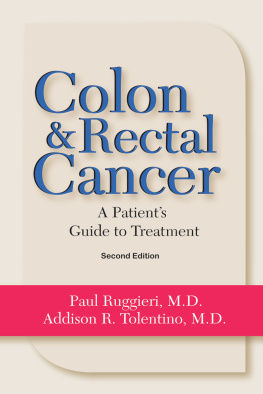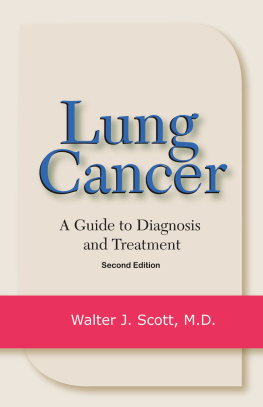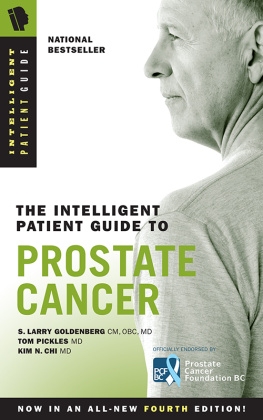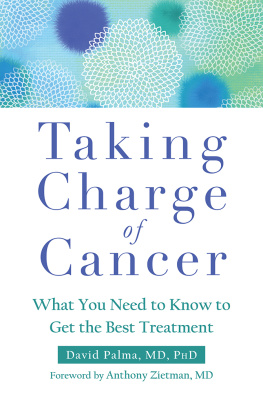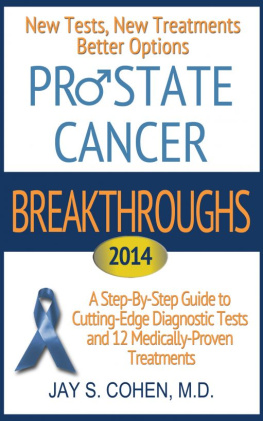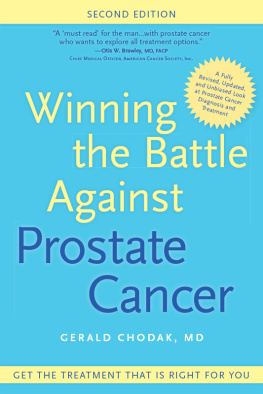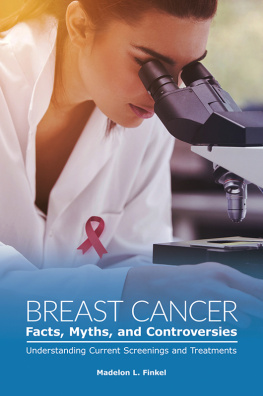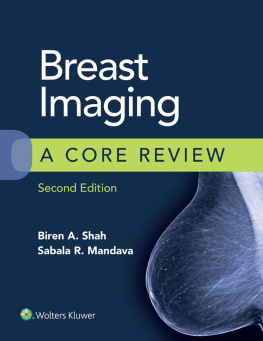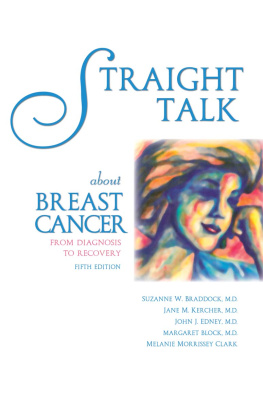An Addicus Nonfiction Book
Copyright 2012 by Paul Ruggieri, M.D., and Addison R. Tolentino, M.D. All rights reserved. No part of this publication may be reproduced, stored in a retrieval system, or transmitted in any form or by any means, electronic, mechanical, photocopied, recorded, or otherwise, without the prior written permission of the publisher. For information, write Addicus Books, Inc., P.O. Box 45327, Omaha, Nebraska 68145.
ISBN 978-1-886039-05-6
Cover and interior design by Jack Kusler
Illustrations by Jack Kusler
This book is not intended to serve as a substitute for a physician, nor do the authors intend to give medical advice contrary to that of an attending physician.
Library of Congress Cataloging-in-Publication Data
Ruggieri, Paul, 1959
Colon & rectal cancer : from diagnosis to treatment / Paul Ruggieri, Addison R. Tolentino. -- 2nd ed.
p. cm.
Includes bibliographical references and index.
ISBN 978-1-886039-05-6 (pbk.)
1. Colon (Anatomy)--Cancer. 2. RectumCancer. I. Tolentino, Addison R., 1969- II. Title. III. Title: Colon and rectal cancer.
RC280.C6R84 2011
616.994347--dc23
2011031606
Addicus Books, Inc.
P.O. Box 45327
Omaha, Nebraska 68145
www.AddicusBooks.com
Printed in the United States of America
10 9 8 7 6 5 4 3 2 1
Contents
Acknowledgments
I would first like to thank all my patients, past and present, for the privilege of being involved in their care. I would also like to acknowledge my patients family members. Their love, understanding, and support are so vital to a loved ones recovery.
I would like to thank Christine Gillespie, R.N., both for her care of my colorectal cancer patients and for her input in this book. I wish to thank Diane Peckham, R.N., certified wound, ostomy, and continence nurse, for her expertise on the care of a colostomy.
I wish to thank radiation oncologist Carol Kornmehl, M.D., author of The Best News about Radiation Therapy, for her contribution to the chapter on radiation therapy. I would also like to thank Mark Pool, M.D., Laboratory Medical Director at Riverside Medical Center, Kankakee, Illinois, for his help in the development of this book.
This book would not have been possible without the efforts of all those involved at Addicus Books. I especially thank Rod Colvin for his uncompromising focus and drive for perfection. I also express my appreciation to Jack Kusler for his illustrations and design work.
Finally, I would like to thank Larry Connors for his inspiration, and my parents for their courage and support.
Paul Ruggieri, M.D.
S everal people made it possible for me to coauthor this book. I would like to acknowledge them all. First, I thank Kris Gaster for introducing me to Addicus Books and the opportunity to be part of the book.
I thank Jessica Muth, nutritionist at the Avera Cancer Institute, for providing information about nutrition during chemotherapy; her contribution was most helpful. I also thank my team, Michelle, Jill, and, Steph, at the Avera Cancer Institute, for their ongoing support.
I wish to thank my family. To my wife, Keesha, and my daughter, Aliyah, I appreciate your love and support during the time I spent working on this book. I also acknowledge my parents. I am grateful to them for having sent me to medical school. Without their love and support, I would not be doing the work of a physicianwork that fulfills me on a daily basis.
I express my appreciation to my publisher Rod Colvin at Addicus Books. A wise adviser, he worked patiently and diligently with me, stressing the importance of clarity and simplicity in the text so that we could do the best job possible in serving readers.
Finally, I thank my patients, who have taught me so much during my years as a medical oncologist. I dedicate this book to you.
Addison R. Tolentino, M.D.
Introduction
H as your life suddenly been interrupted by an unexpected diagnosis of colon or rectal cancer? Or, has someone close to you just been diagnosed with the disease? If so, your first reaction may be shock, denial, or anger. It doesnt seem fair that youre suddenly forced to come face-to-face with a life-threatening disease. You may be thinking, Why me? Why my family? Your reactions and feelings are normal and understandable. It may be of comfort to know that you are not alone.
Unfortunately, cancer affects nearly everyone directly or indirectly. If you or an immediate family member has not been diagnosed with it, you probably know someone who has. This is especially true of colorectal cancer. Colorectal cancer is the third most common cancer in the United States, and the third leading cause of cancer death in the United States.
Our goal in writing this book is to provide you with some peace of mind by answering those pressing questions that arise with a diagnosis of cancer. It is our hope that this book will serve as your guide as you make the journey through treatment.
Colorectal Cancer:
An Overview
I t seems nothing can prepare us for a diagnosis of cancer. Being told you have cancer can bring on a flood of emotionsshock, fear, and confusion. At first, it may be difficult to comprehend the fact that you have cancer. And, in addition to coming to grips with the diagnosis, youre faced with undergoing medical tests and a series of treatments, all of which you probably know little about. It can be a stressful time for you, your family, and friends.
The term colorectal cancer actually refers to two diseases. Colon cancer is cancer found in the tissues of the colon, and rectal cancer forms in the tissues of the rectum. Both cancers have the same characteristics and the same risk factors. In some cases, they are treated the same way, while at other times the treatments are different.
Colorectal Cancer Statistics
Not counting skin cancer, colon cancer is the third most commonly diagnosed cancer in the United States. It affects approximately 102,000 Americans each year, according to the American Cancer Society. Rectal cancer is less common than colon cancer, affecting nearly 40,000 people annually. Both cancers are curable if detected early. And, thanks to improved treatments and greater public awareness about preventive screening, death rates from colorectal cancer have been dropping over the last twenty years.
Anatomy and Function
of the Colon and Rectum
Before discussing colorectal cancer and how it develops, lets first take a brief look at the anatomy of the colon and rectum. The colon and rectum are important parts of your gastrointestinal (GI) tract. This tract includes your mouth, esophagus, stomach, duodenum (first part of your small intestine), small intestine, colon (large intestine), rectum, and anus. This system takes in food, digests it, absorbs nutrients, and excretes waste.
Colorectal Cancer
in the U.S.
- Colon cancer cases diagnosed annually:
- Women: 53,000
- Men: 49,000
- Rectal cancer cases diagnosed annually:
- Men: 23,000
- Women: 17,000
- Approximately 72% of cases are colon cancer.
- Approximately 28% of cases are rectal cancer.
- Lifetime chances of developing colorectal cancer: 1 in 20
American Cancer Society
The primary job of the colon is to manage and remove solid waste. When you eat, food spends several hours in the stomach being digested. Once the nutrients are absorbed in the small intestine, any remaining liquid enters the colon, which is also called the large bowel.

